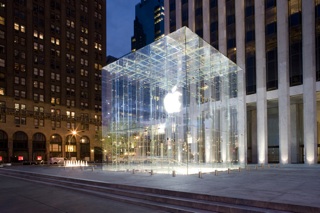 I’m not a financial analyst, so I hesitate to do anything that smacks of analyzing finances. But Apple just released its financial results for its first fiscal quarter and hosted a conference call to discuss them, and the news seems mostly good, especially given the dire condition of the economy. The company reported record quarterly revenue and profit, and also revealed the following:
I’m not a financial analyst, so I hesitate to do anything that smacks of analyzing finances. But Apple just released its financial results for its first fiscal quarter and hosted a conference call to discuss them, and the news seems mostly good, especially given the dire condition of the economy. The company reported record quarterly revenue and profit, and also revealed the following:
Macs: 2.5 million Macs were sold in the quarter, representing 9 percent growth. 71% of them were notebooks; desktop sales, not surprisingly, are down. Macs sold Apple pointed out that an IDC study says that the overall PC market shrunk during the quartert.
iPods: The company sold 22.7 million iPods, representing 3 percent growth. The players have 70 percent market share. iPod revenue, however, was down.
iPhones: 4.4 million handsets were sold in the quarter. 13.7 million were sold in calendar 2008–above the company’s once-daunting 10 million goal.
Apple Stores: The company’s 251 stores in 10 countries sold $1.7 billion of stuff in the quarter, including 515,o000 Macs–“almost half to new owners.” But per-store sales were down because of the touch economy and discounts and deals offered by third-party sellers of Apple products.
A few tidbits based on questions asked by financial analysts who were in on the call–the quotes below are from Apple COO Tim Cook and CFO Peter Oppenheimer:
How’s Steve Jobs? How will Apple fare without him? “Steve is the CEO of Apple, and plans to remain involved in major strategic decisions, and Tim will be responsible for day-to-day operations.” There’s an “extraordinary breadth and tenure of senior Apple executives,” and they lead a team of “wicked-smart” employees. “The values of our company are extremely well-entrenched…We’re on the earth to make good products, and that’s not changing…We believe in saying no to thousands of products…I strongly believe that Apple is doing the best work in its history.”
Will Apple continue to open new Apple Stores given the economic climate? Yes. 25 new stores in FY09, half outside the U.S.
Would Apple sell more iPhones if they cost less? “$199 with contract is compelling…we see nothing else close to it…we’re years ahead of the competition.” Apple isn’t interested in selling cheap, basic phones.
Netbooks: They represent only 3 percent of PC sales. “It’s a category we watch, but right now we think the products there are inferior, and won’t provide an experience to consumers that they will be happy with.”
Apple TV: Sales are up by a factor of three, but it’s still “a hobby” that the company is investing in because it thinks there’s something there long-term.
Snow Leopard, the next version of OS X: They’re excited about it, but no comment beyond that, and no timetable for its release.
The sale of iPhones in Wal-Mart stores: Wal-Mart’s outlets “reach a tremendous amount more people than we could reach in our stores” in areas of the country with no Apple Stores.
iPhone competitors: Most aren’t for sale yet, so it’s hard to judge them. It’s tough for developers to build for platforms which involve devices with different size screens and other variances in features. “We’re very, very comfortable with where we are competitively…we like competition, as long as they don’t rip off our [intellectual property]…and if they do, we’ll go after them.”
Does the Palm Pre’s multi-touch screen violate Apple patents? “I don’t want to talk about any one company…but we will not stand for having our IP ripped off and will use whatever weapons are at our disposal. I don’t know how much clearer I could be than that.”
Apple’s market share: The company had 16 percent unit share, 32 percent revenue share in U.S. retail in the quarter. “I think those are fantastic results, and we’re extremely proud of them.”
What percentage of the 500,000 apps downloaded from the App store were free versus paid? The company isn’t disclosing that.
Others who know way more about crunching numbers will analyze these numbers in depth, and likely poke holes in Apple’s upbeat spin. (Silicon Alley Insider is already saying that iPhone sales were disappointing.) But Apple sold scads of products and made financial progress on multiple fronts in a quarter during which much of Silicon Valley was busy reporting dismal numbers, scaling back ambitions, and laying off employees. It may not live in a reality-distortion field of its own, but its contrarian instincts still seem to be serving it well.
 Twitter may yet prove that it is more than the gilded plaything of venture capitalists , and a productivity killer for those of us who tweet while we should be working. In an interview with UK-based Marketing newspaper, co-founder Biz Stone said that the company was identifying ways to charge for commercial accounts.
Twitter may yet prove that it is more than the gilded plaything of venture capitalists , and a productivity killer for those of us who tweet while we should be working. In an interview with UK-based Marketing newspaper, co-founder Biz Stone said that the company was identifying ways to charge for commercial accounts.
 Apple has taken quite a bit of pride in its successful retail operation, and rightly so. It has grown at a rate not seen by other electronics outlets as of late, and sales have been consistently higher every quarter.
Apple has taken quite a bit of pride in its successful retail operation, and rightly so. It has grown at a rate not seen by other electronics outlets as of late, and sales have been consistently higher every quarter. Reports this morning have it that Microsoft’s venerable Flight Simulator game may be realistically simulating the fate of Pan Am, Eastern, and TWA: Supposedly the
Reports this morning have it that Microsoft’s venerable Flight Simulator game may be realistically simulating the fate of Pan Am, Eastern, and TWA: Supposedly the  I’m not a financial analyst, so I hesitate to do anything that smacks of analyzing finances. But Apple
I’m not a financial analyst, so I hesitate to do anything that smacks of analyzing finances. But Apple  They’re the grim reapers of failing retail chains, except they brandish going-out-of-business signs instead of scythes. And they were surrounding the Circuit City a couple of miles from my house today, which, like the rest of the company’s 500+ U.S. stores, is liqidating its stock as the company goes out of business. When I drove up to the store, I was startled to find a long line of customers waiting to get in, snaking all the way to the Sports Authority next door–maybe the longest such line I’ve ever seen that wasn’t at a store with a fresh batch of iPhones or Wiis. (I sure never saw lines like it when CompUSA, Good Guys, and other defunct chains held their liquidation sales–but perhaps today’s economic climate is leaving shoppers obsessed with finding bargains.)
They’re the grim reapers of failing retail chains, except they brandish going-out-of-business signs instead of scythes. And they were surrounding the Circuit City a couple of miles from my house today, which, like the rest of the company’s 500+ U.S. stores, is liqidating its stock as the company goes out of business. When I drove up to the store, I was startled to find a long line of customers waiting to get in, snaking all the way to the Sports Authority next door–maybe the longest such line I’ve ever seen that wasn’t at a store with a fresh batch of iPhones or Wiis. (I sure never saw lines like it when CompUSA, Good Guys, and other defunct chains held their liquidation sales–but perhaps today’s economic climate is leaving shoppers obsessed with finding bargains.) Deflation is rearing its head in the chip-making business. Advanced Micro Devices intends to
Deflation is rearing its head in the chip-making business. Advanced Micro Devices intends to